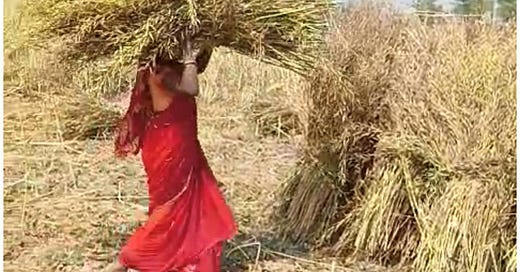Phileas Fogg the main character in the book ‘Around the World in 80 days’, made a wager in the Reform Club in London that he could cross the world (overland) in 80 days, which at the time was unthinkable. In the present day, we have dozens of nations hoping to make a trade deal with the US in a similar time period.
Savitri pictured below and her husband are share croppers who rent land and work on the family farm in North East India. They alongside over an estimated 500 million Indians, primarily along the Ganges basin rely on agriculture for their livelihood. Like their American counterparts that survive pay check to pay check, Savitri lives from harvest to harvest. The green revolution has made life much more secure, with a couple of harvests a year, higher yields and less pests, but this comes at a price. There is an ever increasing bill for fertilisers and pesticides. Thankfully, the Indian government for many years has subsidized these products as an essential means of food security and to prevent the famines of previous generations. As a farm owner we benefit, but most importantly it supports the small holders, who still form the majority of the industry. During election time, the rural and agricultural vote forms the backbone of any incoming government, across almost all states in India.
As JD Vance and his family land in India and look to formulate a trade deal over the course of days, the livelihood of Savitri hangs in the balance. Should India open its markets to American food items, produced far more efficiently on a mass scale at lower cost, or should it continue to look after the interests of the poorest members of society? If India were not a democracy and the decision were purely economic, it would be a no brainer, but it’s not, and life alongside International Trade is much more messy than negotiators in Washington might believe it to be.
The street scene below is taken from a suburb in Osaka during cherry blossom season from a few years ago when I rented a small Toyota car and drove into the nearby countryside. There are two factors that we should think about when it comes to the purchase of cars in Japan, the first is that the average age of a Japanese citizen is nearly 50, with a rapidly growing number of singles (both young and old), many of whom travel locally on scooters and cycles and longer distances in tiny cars. The second is that the concept of a pick up truck or Ford SUV is an anathema, given the tiny roads in their tightly packed manicured cities. How can you buy more of something that you clearly don’t need?
Consumption in conjunction with ageing is reducing in Japan. On a rocky volcanic Island where not much grows and land is scarce, fruits are the ultimate luxury item. As I explored in my first book Demographics Decoded, Japan is rapidly ageing and it is notable that the average Japanese household consumed 89.47kg of fruit in 2008, and by 2017, this was down to 75.05kg. It is difficult to explain that unlike the US where domestic demand continues to increase, in many other countries, the opposite is happening.
Coming back to the UK and the local press coverage around UK/US trade negotiations, always centres around chlorinated chicken and the generally lower food standards that exist in the US as compared to Europe. Higher food standards across the continent do not exist just as an impediment to overseas imports, but rather are part of a cultural benevolence alongside the welfare state that was created following the last war. In my view, the cultural rationale for this is the millennia of serfdom that preceded this period, as characterised by the workhouses in Charles Dickens novels. Indeed, the Duke of Westminster pictured below inherited his wealth a thousand years ago and over half of the land in Britain remains in the hands of a few thousand landowners. This is unlike the US, where the majority of wealth continues to be earned, in Europe, it is increasingly inherited and in order to maintain this status quo, the welfare of the poorest and weakest across the continent remains a concern and this extends to the food they eat.
In Brexit Britain we are uniquely positioned to have seen trade deals be negotiated for years since 2017 onwards. There were frequently ugly scenes with massive industries such as financial services, the largest source of jobs and taxes in London be negotiated in the same light as the fishing industry, a minnow when it comes to jobs and taxes generated for the country. Each country, whether its India, Japan and even the UK have peculiarities around trade, tariffs and as a democracy, what its citizens are able to live with. Often these do not always follow or make economic or rationale sense, despite each of these countries being desperate to agree a trade deal as soon as possible.
It will be very interesting to see what can be accomplished in the coming 80 days and we all very much hope the trade negotiators can match Phileas Fogg in his great accomplishment, from Jules Verne’s book.






